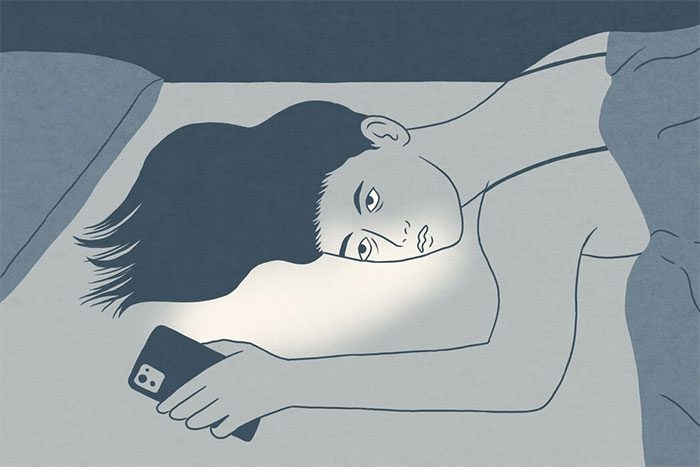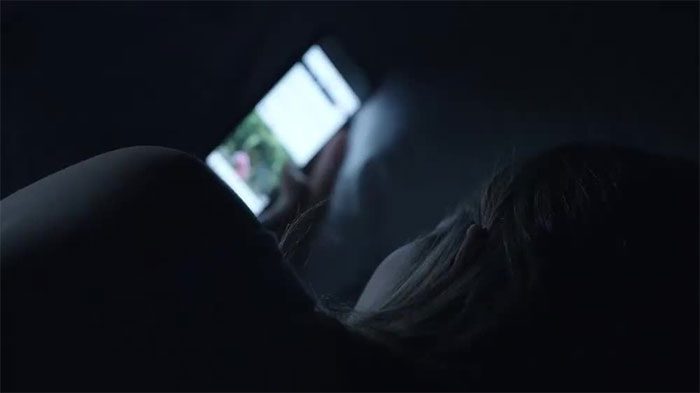Contrary to popular belief, sleeping on your back is the worst sleeping position. People should sleep on their stomach or side to avoid issues such as sleep apnea.
Difficulty sleeping is a common problem these days, especially among the younger generation. According to Dr. Keisha Sullivan at Keisha Sullivan Health Care Institute, the main reasons many people struggle to fall asleep include the use of stimulants, hormonal changes such as pregnancy and menopause, and mental health issues.
Many have turned to Google for advice, as numerous sleep tips are shared across social media, often contradicting one another.

You should also limit exposure to blue light before sleeping. (Image: New York Times).
Doctors Recommend Sleeping on Your Stomach as the Best Position
TikToker Jayde Carroll garnered 350,000 views for a video warning users against sleeping on their stomachs because “studies show this is the worst sleeping position.” He encourages everyone to sleep on their side as it is best.
Dr. Sullivan largely agrees with this viewpoint, as she often advises her patients to sleep on one side. However, if one cannot sleep on their side, she suggests that sleeping on the stomach is the next best option.
“Sleeping flat on your back is the worst position. This may come as a surprise to many</em,” Sullivan says. She explains that when sleeping on your back, the tongue and jawbone can fall back, obstructing the airway during sleep. This is particularly dangerous for patients suffering from sleep apnea.
Additionally, according to Sullivan, individuals should keep the room temperature between 16-22 degrees Celsius to lower body temperature and promote easier sleep. Another tip is to avoid entering the bedroom or getting on the bed until you genuinely want to rest.
The reason is that the human brain typically categorizes spaces and associates them with different activities, such as the kitchen for eating, the living room for socializing, the desk for working, and the bed for sleeping.

Many sleep tips on the internet lack scientific validation. (Image: Shutterstock).
Therefore, you need to train your body to recognize sleep signals by separating daily activities from the sleeping space to fall asleep more easily. If you work all day in bed, your body will become confused and think that activity is always meant to take place in the bedroom.
People should also take a warm bath before bed to help them sleep better. This habit boosts blood circulation, relaxes the nerves, allows blood to flow more freely, and temporarily lowers body temperature.
Another suggestion is to wear socks while sleeping. Socks not only keep your feet warm throughout the night but also help regulate body temperature. “When the body increases melatonin production at the end of the day, temperature begins to decrease to facilitate sleep. Therefore, wearing socks will help dilate blood vessels, pushing blood to the hands and feet to accelerate the process of lowering body temperature, leading to quicker sleep,” Sullivan explains.
Establishing Good Pre-Sleep Habits
Eating at least 3 hours before sleep, working at least 2 hours before bed, and stopping phone use 1 hour before sleeping are some of the most common recommendations for those struggling with insomnia.
However, Dr. Sullivan believes people do not need to adhere to these rules rigidly, but just spacing out meal times and technology use from bedtime is sufficient.

Blue light from screens reduces melatonin production, leading to insomnia. (Image: Shutterstock).
You can also eat protein-rich foods before bed to help with sleep. “Foods rich in magnesium, like nuts, fish, and eggs, help regulate neurotransmitters, making it easier to sleep,” Sullivan says. The expert also recommends warm milk, cherry juice, or goji berries before bed.
Moreover, you should consider the advice to use a red night light in the bedroom since this type of light is said to produce melatonin, the hormone responsible for regulating the sleep-wake cycle.
Dr. Sullivan argues that this advice lacks scientific backing. Additionally, even with a red night light, exposure to blue light from phones, computers, or other screens hinders melatonin production.
Instead, you might find it helpful to keep a journal to sort out your thoughts from the day before sleeping so they don’t linger in your mind while in bed. This is also a good starting point to establish a nightly routine that allows for quicker physical and mental rest.


















































